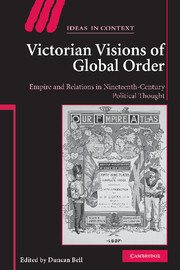 Victorian Visions of Global Order
Victorian Visions of Global Order Published online by Cambridge University Press: 22 September 2009
INTRODUCTION
In Liberalism (1902), Herbert Samuel wrote with John Stuart Mill surely in mind:
Liberals hold that the ultimate purpose of politics is nothing narrower than to help men to advance towards the best type. No people can reach the goal, indeed, unless they have liberty: but there may be stages in the march when unrestrained liberty is rather a hindrance to them than a help. A barbarian race may prosper best if for a period, even for a long period, it surrenders the right of self-government in exchange for the teachings of civilization. Because we think freedom better than control, we do not count it a kindness to let a child do whatever he likes, or a sick man eat whatever he fancies: and because we hold that democracy is good for the Englishman and the Frenchman, we need not pedantically pretend that it must always be good for the Indian or the African as well.
Other new liberals followed Samuel in echoing Mill's prejudices as much as what they took to be his liberalism's core principles. And while their prejudices were certainly not uniquely utilitarian, their core principles certainly were, although the received view of new liberals has continued to suggest otherwise. But unlike earlier utilitarian liberals, they also borrowed generously from Kant, Hegel and Darwin, transforming late Victorian and early twentieth-century utilitarianism rather significantly, including utilitarian international politics.
To save this book to your Kindle, first ensure no-reply@cambridge.org is added to your Approved Personal Document E-mail List under your Personal Document Settings on the Manage Your Content and Devices page of your Amazon account. Then enter the ‘name’ part of your Kindle email address below. Find out more about saving to your Kindle.
Note you can select to save to either the @free.kindle.com or @kindle.com variations. ‘@free.kindle.com’ emails are free but can only be saved to your device when it is connected to wi-fi. ‘@kindle.com’ emails can be delivered even when you are not connected to wi-fi, but note that service fees apply.
Find out more about the Kindle Personal Document Service.
To save content items to your account, please confirm that you agree to abide by our usage policies. If this is the first time you use this feature, you will be asked to authorise Cambridge Core to connect with your account. Find out more about saving content to Dropbox.
To save content items to your account, please confirm that you agree to abide by our usage policies. If this is the first time you use this feature, you will be asked to authorise Cambridge Core to connect with your account. Find out more about saving content to Google Drive.